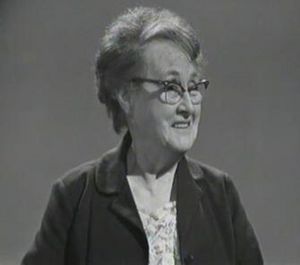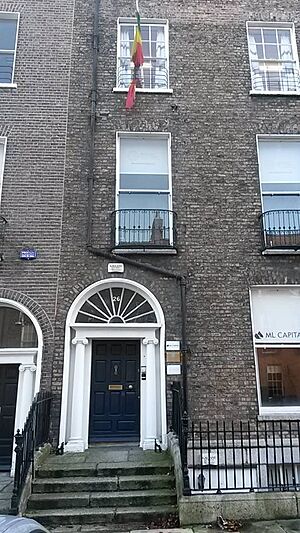Fiona Plunkett facts for kids
Quick facts for kids
Fiona Plunkett
|
|
|---|---|

Plunkett in January 1966 during an interview with RTÉ
|
|
| Born | 11 January 1896 Dublin, Ireland
|
| Died | 1977 Dublin, Ireland
|
| Nationality | Irish |
| Education | Mount Anville Secondary School |
| Parent(s) |
|
| Relatives | 6 siblings, including Joseph Mary Plunkett (Brother) and George Oliver Plunkett (Brother) |
Fiona Plunkett (born Josephine Plunkett; 11 January 1896 – 12 July 1977) was an important Irish woman who believed strongly in an independent Ireland. She helped organize the Easter Rising in 1916. She was also a key leader in Cumann na mBan, a women's group that supported Irish independence.
Contents
Fiona Plunkett's Early Life
Family and Childhood
Fiona Plunkett was born Josephine Plunkett on January 11, 1896. Her name was later shortened to Fiona, and then to Fi. She was the daughter of George Noble Plunkett and Josephine Cranny. Fiona grew up in Dublin, Ireland, at 26 Upper Fitzwilliam Street.
She was the youngest of seven children. Her siblings were Philomena, Mary, Geraldine, Jack, George, and Joseph Plunkett. All of her brothers and sisters were involved in the Easter Rising. Her brother Joseph was very important. He signed the document that declared Ireland a republic. He was later executed because of his role in the Rising.
Fiona's father was in charge of the National Museum of Ireland. However, he had to leave his job. He was sent away to Oxford because of what he and his children did in the 1916 Rising. Later, he became a politician. He joined the new Sinn Féin party. Even though her family was very political, Fiona started her own political work later. She was 26 years old during the Irish Civil War. Fiona was engaged three times but never married. She passed away in 1977 in Dublin at the age of 81.
How Fiona Plunkett Was Educated
Fiona Plunkett tried to get an education by listening to her brothers' lessons. She went to the Convent of the Sacred Heart for a short time. This was a fancy school in Leeson Street. She also attended another convent school called Mount Anville.
She was lucky to have access to her father's large library. This allowed her to read many books on different topics.
Fiona Plunkett's Political Beliefs
Early Activism
Fiona Plunkett's strong political ideas came from her father and brothers. Her belief in an independent Ireland guided her actions throughout her life. When she was a young girl, she helped people who were struggling. She was part of a group that gave food to workers. These workers were very hungry because of the 1913 Dublin Lock-out.
In 1916, she joined Cumann na mBan. This was a women's military group. She helped organize the 1916 Easter Rising, even though she didn't fight directly.
Her brother Joseph was executed for leading the Rising. His younger brothers, George and Jack, were sent to prison in England.
Her Role in Cumann na mBan
In 1917, Cumann na mBan started to grow again. More women joined the group, and so did Sinn Féin. New branches of Cumann na mBan were formed. Nine women were chosen to lead Cumann na mBan. These included Fiona Plunkett, Nancy O'Rahilly, Margaret Pearse, Áine Ceannt, Kathleen Clarke, Nancy Wyse Power, Mary McSwiney, and Madge Daly.
These women were often the mothers, sisters, or wives of the Rising's leaders. They felt their voices were not always heard. Fiona Plunkett did not want Cumann na mBan to join completely with Sinn Féin. She remained very close to her sister-in-law, Grace Gifford.
Standing Up for Political Prisoners
In 1926, Fiona Plunkett was arrested and sent to prison. This was because she was involved in political activities. She was charged with helping to form an illegal group and having items related to their cause.
In 1942, Fiona Plunkett spoke out at a ceremony. This event was held to remember the Rising at Arbor Hill church. She criticized the Irish government for how it treated political prisoners. Her brother Jack was a prisoner at that time. He was on a hunger strike in Arbor Hill Prison. The government censored, or blocked, news about Fiona's speech in the newspapers.
In 1971, Fiona Plunkett wrote a letter to The Irish Times newspaper. She criticized a peace agreement in Northern Ireland. She urged the Irish people to continue fighting against "British domination." She felt that celebrating peace while Britain was still in Ireland was not right. In 1976, she was again charged for taking part in a banned event. This event was to remember the 1916 Rising at the GPO.
Death and Legacy
Fiona Plunkett passed away on July 12, 1977, when she was 81 years old. She was buried in Glasnevin cemetery in the Republican plot. Her life and contributions are remembered in a book. It is called All in Blood: a memoir, written by her older sister Geraldine Dillon.
 | James Van Der Zee |
 | Alma Thomas |
 | Ellis Wilson |
 | Margaret Taylor-Burroughs |


